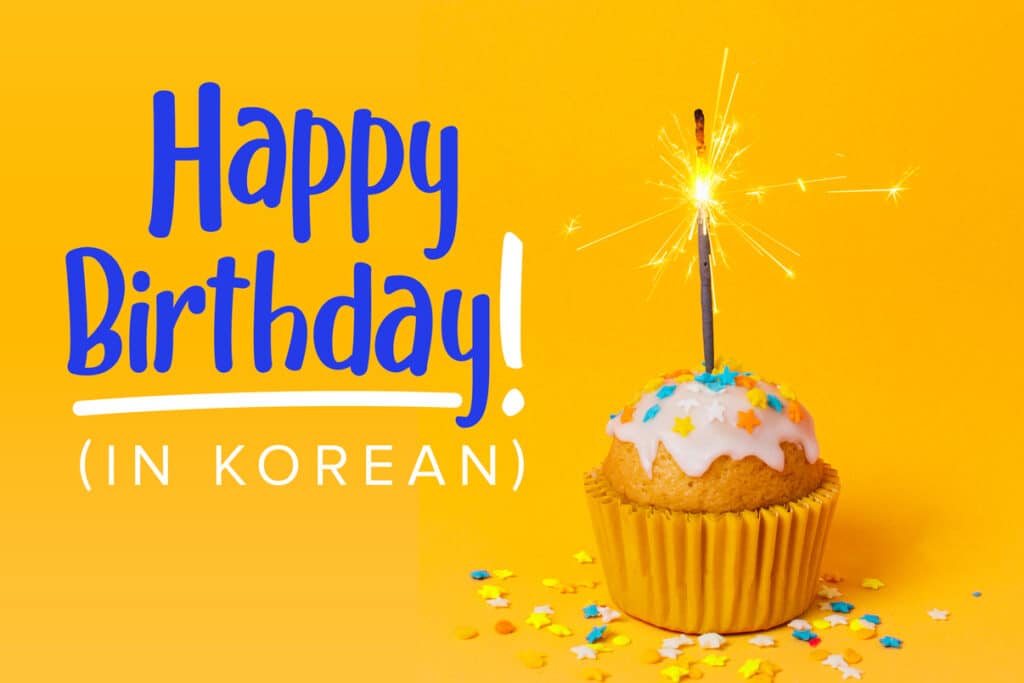
How to Wish Someone a Happy Birthday in Korean
The clock strikes midnight, and already you feel a little bit different.
That’s right! It’s your birthday, and you know what to expect based on your own culture and upbringing.
But now that you’re studying Korean, you’re probably curious about how Korean folks might have their own birthday bash.
In this post, I’ll go over how you can wish someone a happy birthday in Korean, plus some special birthday customs you should expect.
Contents
- How To Say Happy Birthday in Korean
- How To Celebrate Birthdays in Korea
- The Korean Happy Birthday Song
- And One More Thing...
Download: This blog post is available as a convenient and portable PDF that you can take anywhere. Click here to get a copy. (Download)
How To Say Happy Birthday in Korean
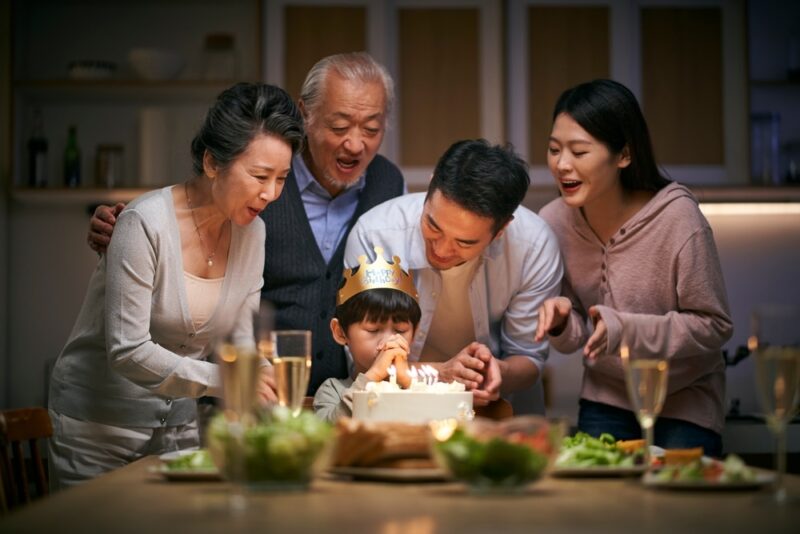
How you say happy birthday will largely depend on who you’re saying it to. Understanding the relationship you have with your conversation partner is a big deal when it comes to talking in Korean.
Here are some different ways of saying it in descending levels of formality. Check out this post on honorifics and titles, and if in doubt, always use a more formal version of the phrase!
1. 생신을 축하드립니다
Romanization: Seng-shin-eul chook-ha-deu-rim-ni-da
Formality: Formal
This is a formal way of wishing someone a happy birthday. 생신 is the more respectful way of saying birthday in Korean (we’re show you the more common word below).
The ending of 드립니다 may have already clued you to the formality, if you’re familiar with verb conjugation based on formality level. It’s appropriate to use for your elders or those in a higher position, such as your boss or teacher.
As you’ll see in several examples below, in Korean you usually use titles to address others rather than names.
생신을 축하드립니다, 대표님! 오늘 저희 회사에서 이 과일 바구니를 생신 선물로 가져왔습니다.
Happy birthday, Ms. CEO! Our company brought this fruit basket for you today as a birthday gift.
2. 생신 축하드려요
Romanization: Seng-shin chook-ha-deu-ryuh-yo
Formality: Formal
You could alternatively say this one instead of the first one. All this phrase is doing is taking the formality level one notch down by replacing 드립니다 with 드려요 part, although it might be slightly harder to pronounce!
Since 생신 is still used here, it’s nonetheless extremely polite. You can still use this one with elders, bosses and teachers, although perhaps you know them slightly better than the people in the previous phrase.
생신 축하드려요, 교수님! 파티를 하실 거예요?
Happy birthday, Professor! Are you going to have a party?
3. 생일 축하합니다
Romanization: Seng-il chook-ha-ham-ni-da
Formality: Formal
This is likely the most common happy birthday phrase you’ll hear. Note the difference in the wording compared to the more formal variant. 생일 literally translates to “birthday” (생 meaning birth, 일 meaning day).
It’s polite in tone and appropriate for most occasions, whether you’re using it for acquaintances or those older than or close to your age.
생일 축하합니다, 선생님! 오늘 우리에게 많은 숙제를 주지 마세요.
Happy birthday, teacher! Please don’t give us a lot of homework today.
4. 생일 축하해요
Romanization: Seng-il chook-ha-hae-yo
Formality: Polite
This is the next most common one. It too is polite in tone (evidenced by the presence of 요), although I’d say it’s a bit less formal than 생일 축하합니다.
This might be a good one suited for peers or people who are younger than you, but you work with them or are not necessarily friends or extremely close.
생일 축하해요, 이태민씨! 오늘 좋은 하루 되세요!
Happy birthday, Mr. Lee! Have a nice day today!
5. 생일 축하해
Romanization: Seng-il chook-ha-heh
Formality: Informal
Notice the lack of honorific language in the phrase–it implies that you don’t have to be so uptight or respectful to the birthday boy or girl.
This is informal in nature and is appropriate for your friends and casual acquaintances around your age or younger. You could use it with people you are pretty close with, such as your family as well. Although some families stick to being more polite!
생일 축하해, 지연아! 생일 파티는 몇 시야?
Happy birthday, Ji-yeon! What time is the birthday party?
6. 생축
Romanization: Seng-chook
Formality: Very informal
This is a slang variant that is just a greatly abbreviated version of the typical happy birthday phrase. You may see it in text or online. Another abbreviation you might encounter is 생일 ㅊㅋㅊㅋ, read as seng-il choo-ka choo-ka.
It’s common in Korean social media to simply shorten familiar phrases into singular Hangul letters. Since this is slang we’re talking about, you should reserve these specific happy birthday phrases for close friends or online pals.
순영아, 생축!! 우리 나중에 만나는 거지? 생일 ㅊㅋㅊㅋ!
Soon-yeong, happy birthday!! We’re going to meet later, right? HBD!
One way to practice all these sentences is through a language learning program such as FluentU, which shows you how the language is really used by native speakers in different situations.
FluentU takes authentic videos—like music videos, movie trailers, news and inspiring talks—and turns them into personalized language learning lessons.
You can try FluentU for free for 2 weeks. Check out the website or download the iOS app or Android app.
P.S. Click here to take advantage of our current sale! (Expires at the end of this month.)
How To Celebrate Birthdays in Korea
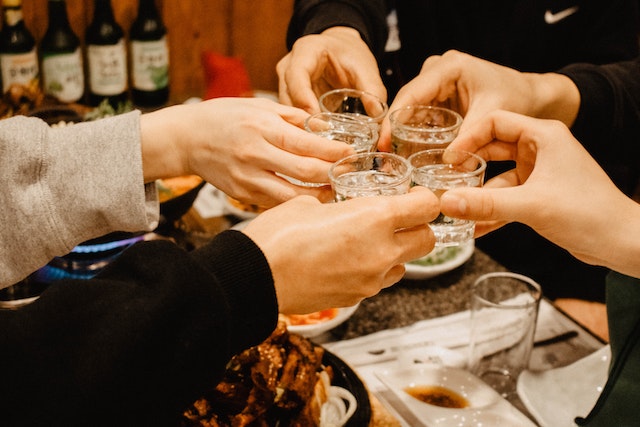
Korean Birthday Customs
In modern times, Korean birthday celebrations don’t look much different from Western ones. A cake, some presents and a fun get-together are the usual expectations.
Kids may have a party with their family members and friends, while older folks may celebrate at home, a bar or a restaurant. For the latter, it’s likely that plenty of alcoholic drinks like 소주 (so-ju) will go around the table.
To really follow tradition, birthday persons may also eat the seaweed soup known as 미역국 (mi-yuk-gook). This nutritious dish has a history of being a food consumed by expecting pregnant women. It has a strong connotation to birth and health, making it a fitting choice as a birthday meal.
The Korean Aging System
Let’s say you meet a Korean person who was born on May 12, 1990. So, on May 13, 2023, you may say to them “Hey! Congratulations on turning 33 years old!” They might correct you and say they’re actually 34 years old. Ask them again on January 2, 2024, and they’ll proclaim they’re 35 years old.
According to Korean culture, you’re technically considered one year old the moment you’re born. This is sensible, since you were “alive” for nine months in the womb, which is close enough to a year. Furthermore, you actually age up a year right at New Year’s, on January 1.
This means that in Korea, a person’s age can be one or two years older than they would be considered internationally. If you’re wondering how this works, then you can quickly calculate your own Korean age.
The birth age is still used for most official documentation and formal paperwork, so this system is used more in general everyday life. Plus, it’s currently being phased out, with the switch to the international aging system coming up in June 2023.
A Korean Baby’s First Birthday
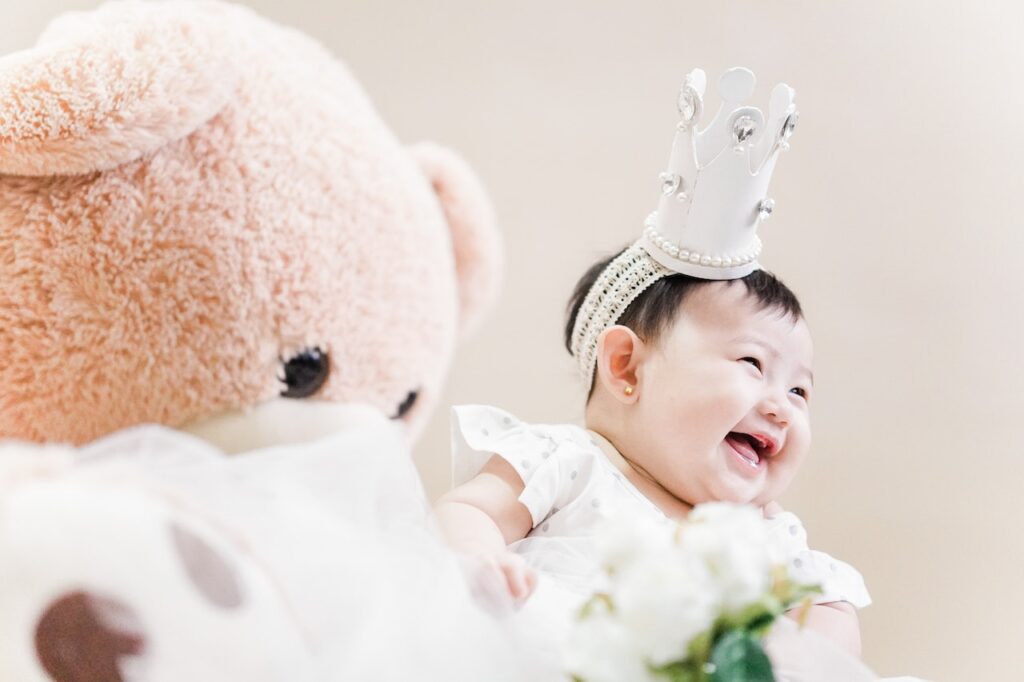
A very special birthday celebration takes place when you turn an impressive one year old. It even has its own name: 돌잔치 (dol-jan-chi). Alongside a big party with family members and guests, one-year-old babies have an important job to play in their own festivities.
The toddlers will be dressed in a special traditional 한복 (han-bok). They may be seated before an impressive spread of Korean food that includes plenty of colorful rice cakes known as 떡 (tteok) and fruits.
The child will then be presented with an arrangement of what appear to be miscellaneous items. The item options are usually decided by the parents, but they typically include something like a bowl of rice, a pencil, a book, thread, money bills and more. Modern variants can include items like a smartphone, a computer mouse, a sports ball and so forth.
At some point, the baby may grab at or show interest in one or two items. Whatever is chosen is said to symbolize a specific fortune. For example:
- Choosing a pencil: the child will gain strong writing and or academic skills
- Choosing a paintbrush: the child will be artistically gifted
- Choosing money: the child will become rich
- Choosing thread or yarn: the child will live a long life
- Choosing a food item: the child will not go hungry
Modern items follow a similar system of fortune-telling. For example, a child picking up a computer mouse can suggest they’ll be nifty with technology.
This fun and exciting event, called 돌잡이 (dol-jap-ii), gives loved ones a chance to imagine a bright future for the baby of the hour.
A Korean Person’s 60th Birthday
Reaching the age of 60 is also considered a special occasion in Korea.
If you’re familiar with the Chinese zodiac, then you might know why. 60 years is the marker when you’ve reached a full cycle of your zodiac lifespan, so that the calendar again points to the same zodiac signs under which you were born.
Most Korean folks are well-attuned to their zodiac. In the past, just like how it was good fortune for a baby to reach their first birthday, it was also considered momentous for one to reach the ripe old age of 60. Celebrating this occasion is known as 환갑 (hwan-gap).
It’s typical for the birthday person’s family to throw them a memorable party. Alternatively, the individual can opt to go on a nice trip with their loved ones.
There are also some who choose not to celebrate their 60th. Instead, they may save more lavish festivities for a more “impressive” birthday like their 70th, 80th or even their 90th.
The Korean Happy Birthday Song
You’ll be pleased to know that it’s actually very simple to sing the happy birthday song in Korean. You only have to know two phrases.
The first is 생일 축하합니다, which we’ve already discussed to be the formal way of saying “Happy birthday.” Even though this is the phrase of choice, the song is appropriate for pretty much everyone: young, old, friends, acquaintances or strangers.
The second phrase is 사랑하는 (우리) ________ (씨), which means “Beloved (insert name)”, with the option to include 우리 before the name or 씨 after the name:
- 우리 means “our” and is typically used for close friends and family members, especially if they’re younger.
- 씨 is a basic Korean honorific that you may want to include if the birthday person deserves a little more respect (such as your workplace colleague).
With those two phrases, the format of the actual song goes like this:
생일 축하합니다
Happy birthday to you
생일 축하합니다
Happy birthday to you
사랑하는 (우리) ________ (씨)
Beloved _______
생일 축하합니다
Happy birthday to you
Sing it to the same tune as “Happy Birthday to You” (yes, the English one you know by heart) and that’s it. It’s that easy!
Sometimes, the song can include a few extra lines (such as in the video above), though they can vary a lot depending on the context. However, you’ll more often hear just the simple two-phrase song.
Korean birthday customs have both familiar and unique features. They’re another fun and worthwhile aspect of Korean culture to learn, alongside your Korean language studies.
So bust out the cake (or 미역국 ) and start the celebrations!
Download: This blog post is available as a convenient and portable PDF that you can take anywhere. Click here to get a copy. (Download)
And One More Thing...
If you enjoyed this post, you're already halfway to having the time of your life learning Korean with FluentU!
FluentU makes it possible to learn with K-pop videos, funny commercials, entertaining web series and more. Just a quick look will give you an idea of the variety of FluentU videos on offer:
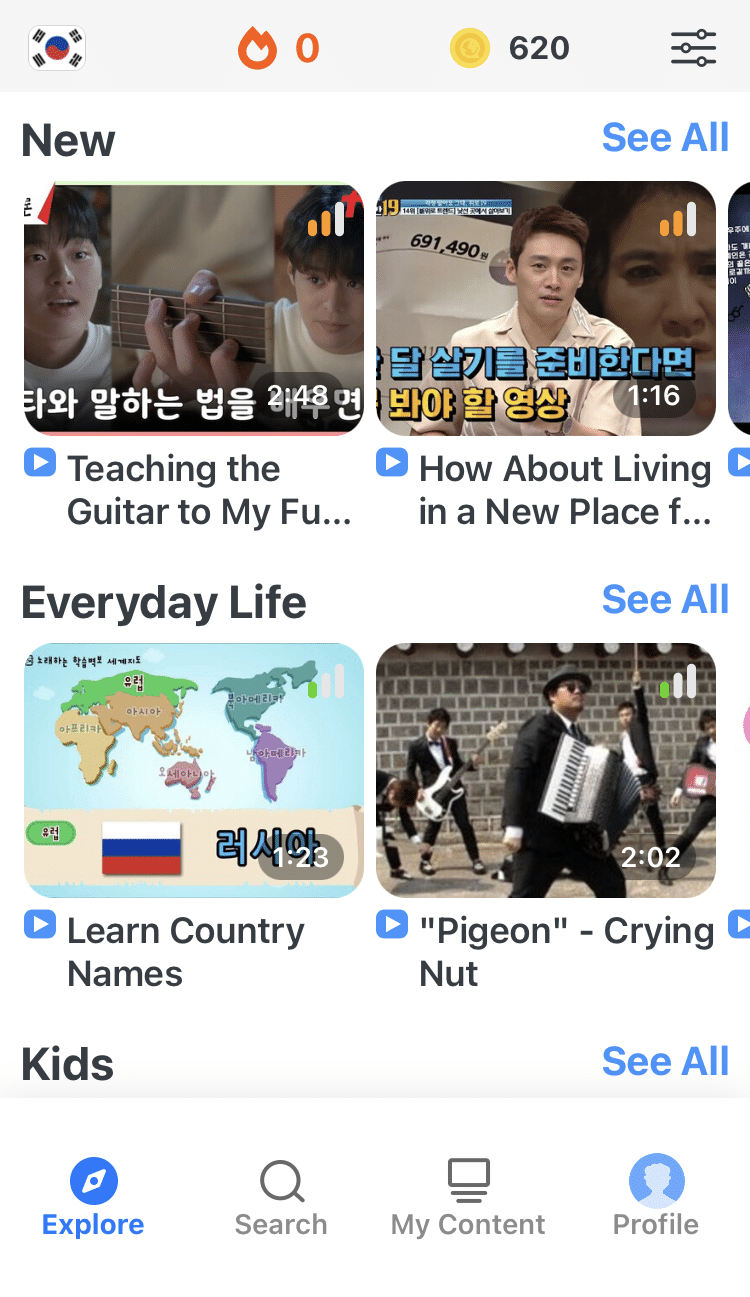
FluentU really takes the grunt work out of learning languages, leaving you with nothing but engaging, effective and efficient learning. It's already hand-picked the best videos for you (which are organized by level and topic), so all you have to do is simply choose any video that strikes your fancy to get started.
Each word in the interactive captions comes with a definition, audio, image, example sentences and more.

Access a complete interactive transcript of every video under the Dialogue tab, and easily review words and phrases from the video under Vocab.
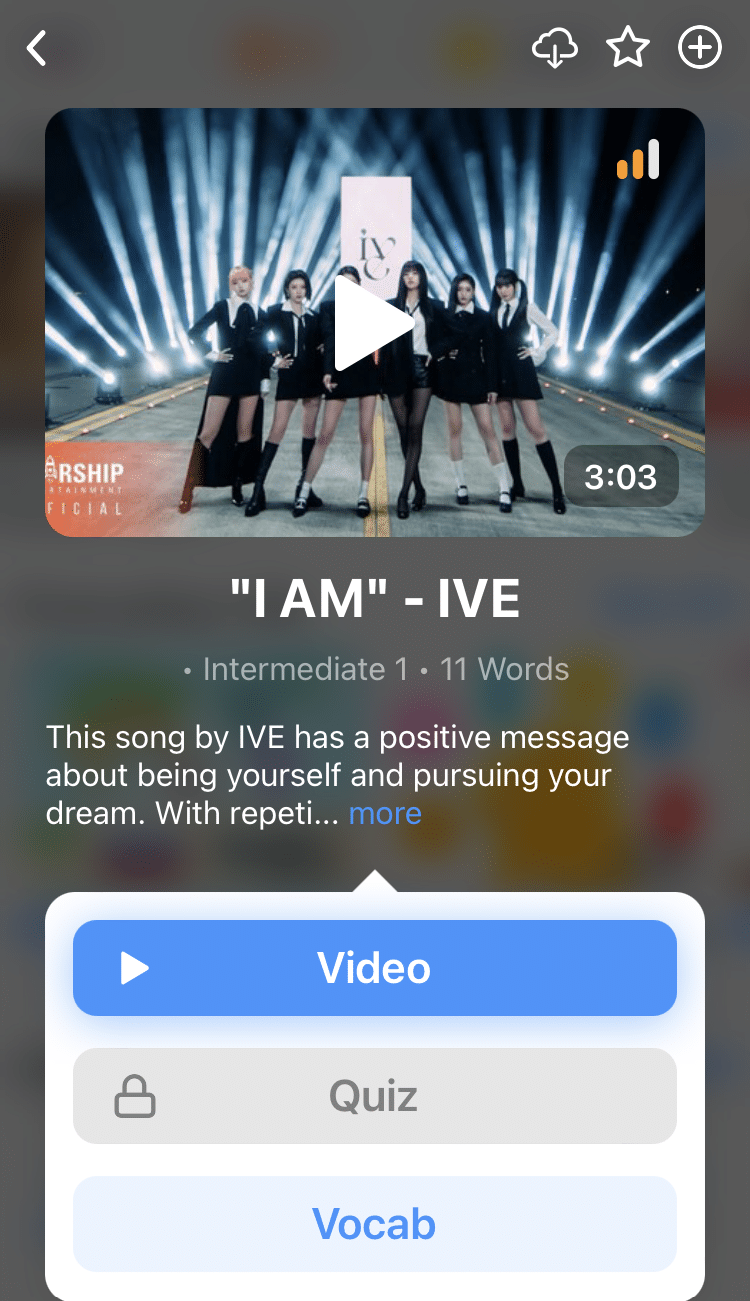
You can use FluentU’s unique Quiz Mode to learn the vocabulary and phrases from the video through fun questions.
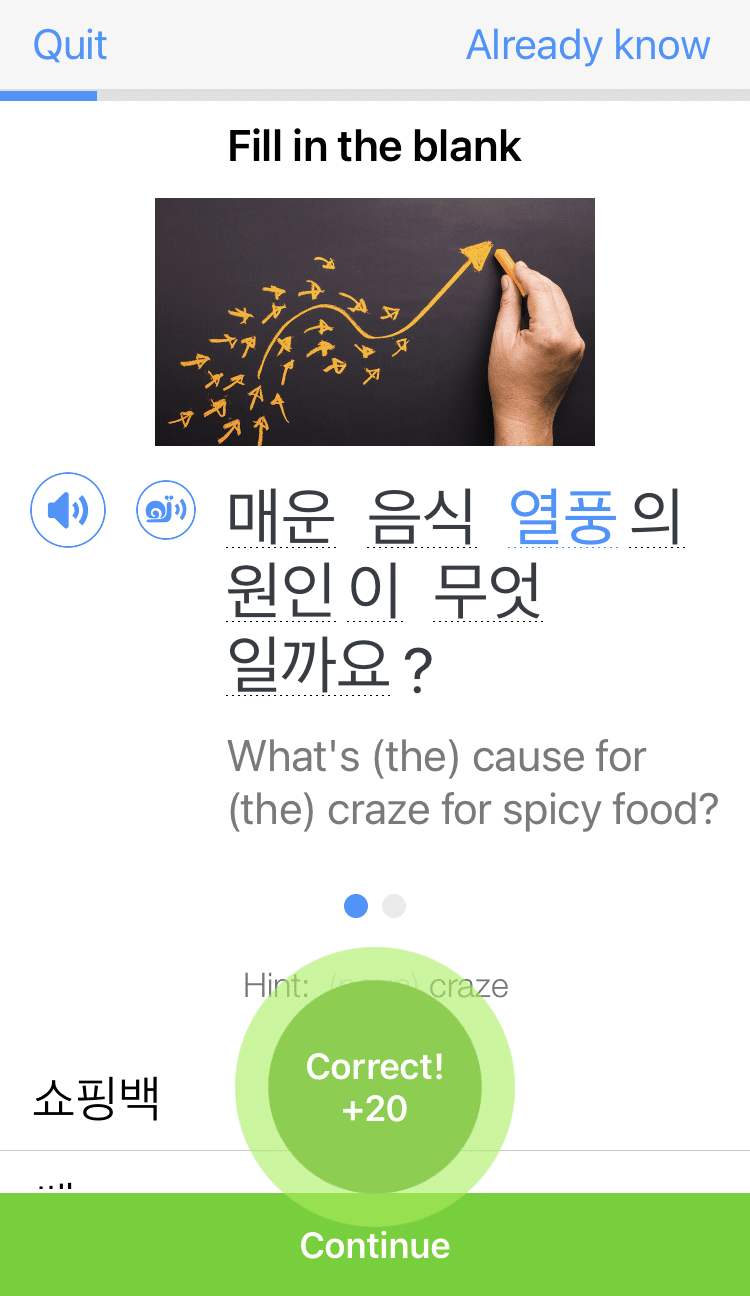
FluentU keeps track of what you're learning, and tells you exactly when it's time for review, giving you a 100% personalized experience.
Review sessions use video context to help embed the words in your memory.
Start using the FluentU website on your computer or tablet or, better yet, download the FluentU app from the iTunes or Google Play store. Click here to take advantage of our current sale! (Expires at the end of this month.)



